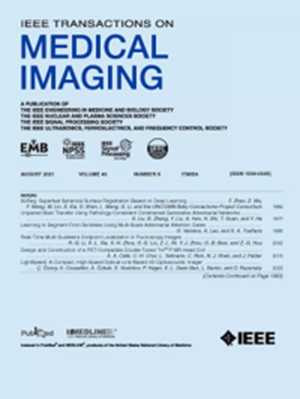DEQ-MPI:具有学习一致性的磁粒子成像深度平衡重构。
IF 8.9
1区 医学
Q1 COMPUTER SCIENCE, INTERDISCIPLINARY APPLICATIONS
引用次数: 5
摘要
磁颗粒成像(MPI)为追踪磁性纳米颗粒提供了无与伦比的对比度和分辨率。一个常见的成像程序校准系统矩阵(SM),该矩阵用于从后续扫描中重建数据。该方法可以在增强数据一致性的同时,利用先验图像对其进行正则化,从而解决非定常重构问题。传统的手工先验不能捕获MPI图像的复杂属性,而最近基于学习先验的MPI方法存在推理时间过长或泛化性能有限的问题。本文提出了一种基于学习数据一致性的深度平衡模型(DEQ-MPI)的物理驱动的MPI重建方法。DEQ-MPI通过将神经网络增强为迭代优化来重建图像,灵感来自深度学习中的展开方法。然而,传统的展开方法在计算上受限于很少的迭代,导致不收敛的解决方案,并且它们使用手工制作的一致性度量,可能会产生数据分布的次优捕获。相反,DEQ-MPI训练隐式映射来最大化收敛解决方案的质量,并且它结合了一个学习一致性度量来更好地解释数据分布。模拟和实验数据表明,DEQ-MPI在图像质量和推理时间上优于最先进的MPI重建方法。本文章由计算机程序翻译,如有差异,请以英文原文为准。
DEQ-MPI: A Deep Equilibrium Reconstruction with Learned Consistency for Magnetic Particle Imaging.
Magnetic particle imaging (MPI) offers unparalleled contrast and resolution for tracing magnetic nanoparticles. A common imaging procedure calibrates a system matrix (SM) that is used to reconstruct data from subsequent scans. The ill-posed reconstruction problem can be solved by simultaneously enforcing data consistency based on the SM and regularizing the solution based on an image prior. Traditional hand-crafted priors cannot capture the complex attributes of MPI images, whereas recent MPI methods based on learned priors can suffer from extensive inference times or limited generalization performance. Here, we introduce a novel physics-driven method for MPI reconstruction based on a deep equilibrium model with learned data consistency (DEQ-MPI). DEQ-MPI reconstructs images by augmenting neural networks into an iterative optimization, as inspired by unrolling methods in deep learning. Yet, conventional unrolling methods are computationally restricted to few iterations resulting in non-convergent solutions, and they use hand-crafted consistency measures that can yield suboptimal capture of the data distribution. DEQ-MPI instead trains an implicit mapping to maximize the quality of a convergent solution, and it incorporates a learned consistency measure to better account for the data distribution. Demonstrations on simulated and experimental data indicate that DEQ-MPI achieves superior image quality and competitive inference time to state-of-the-art MPI reconstruction methods.
求助全文
通过发布文献求助,成功后即可免费获取论文全文。
去求助
来源期刊

IEEE Transactions on Medical Imaging
医学-成像科学与照相技术
CiteScore
21.80
自引率
5.70%
发文量
637
审稿时长
5.6 months
期刊介绍:
The IEEE Transactions on Medical Imaging (T-MI) is a journal that welcomes the submission of manuscripts focusing on various aspects of medical imaging. The journal encourages the exploration of body structure, morphology, and function through different imaging techniques, including ultrasound, X-rays, magnetic resonance, radionuclides, microwaves, and optical methods. It also promotes contributions related to cell and molecular imaging, as well as all forms of microscopy.
T-MI publishes original research papers that cover a wide range of topics, including but not limited to novel acquisition techniques, medical image processing and analysis, visualization and performance, pattern recognition, machine learning, and other related methods. The journal particularly encourages highly technical studies that offer new perspectives. By emphasizing the unification of medicine, biology, and imaging, T-MI seeks to bridge the gap between instrumentation, hardware, software, mathematics, physics, biology, and medicine by introducing new analysis methods.
While the journal welcomes strong application papers that describe novel methods, it directs papers that focus solely on important applications using medically adopted or well-established methods without significant innovation in methodology to other journals. T-MI is indexed in Pubmed® and Medline®, which are products of the United States National Library of Medicine.
 求助内容:
求助内容: 应助结果提醒方式:
应助结果提醒方式:


